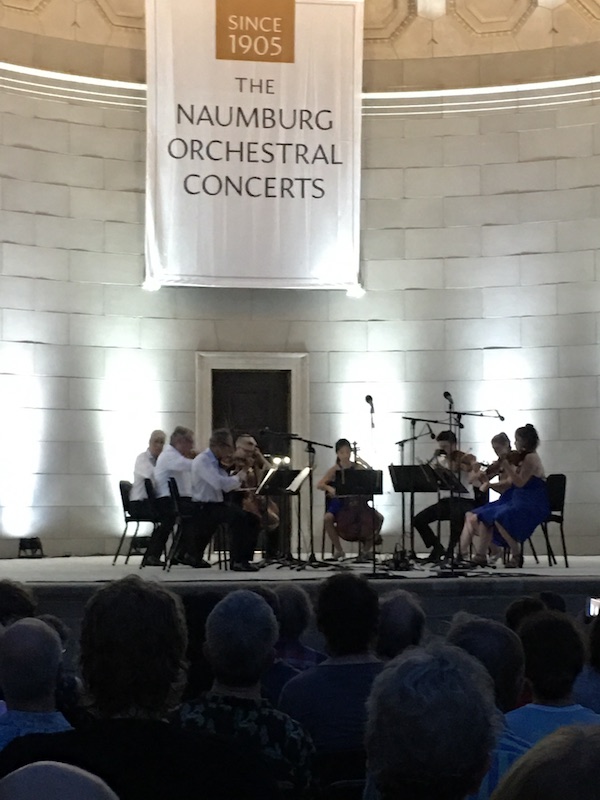When choppers attack! Central Park chamber concert bedeviled by tourist helicopters

The Naumburg Bandshell in Central Park is one of the primary outdoor places to enjoy classical music in New York right now. Recently restored this fine venue is currently one of the few classical with a regular, in-person concert schedule.
Tuesday night, that schedule brought the mixed and combined forces of the Emerson and Ulysses String Quartets. The musicians, playing Strauss, Bruckner, Shostakovich, and the Mendelssohn Octet battled the elements with some verve, and succeeded in the end, though it was close call.
Outdoor concerts already confront the distractions of noise, not just the usual phone sounds and chatter, but barking dogs, buskers within earshot, the clatter of bottles and cans. On top of this, Tuesday meant 91 degrees and humidity, which affected the playing. And then there was the maddening harassment of tourist helicopters, which for some reason are allowed to fly over Central Park and ruin the experience of the place for everyone there.
This can be tough on both audience and musicians, and one way to overcome it is through the kind of program that muscles through all the noise with music that demands attention and brings out the energy in the players. For the most part though, that wasn’t this concert. Instead the selection seemed designed to bring various configurations of the two quartets, via Strauss’s Sextet from Capriccio and the third movement of Bruckner’s F Major String Quintet. Mendelssohn’s great Octet was preceded by Two Pieces For String Octet, Op. 11, written by Shostakovich when he was still a teenager.
On paper, there’s a vast difference in stature between the finale and the first three pieces, and that was realized in the performances. Strauss’ reduction of a clichéd scene from the already clichéd Capriccio is the kind of pleasant domesticated music—its slight tang of chromaticism cut by a calculated sweetness—that fits into afternoon programming for radio stations that play popular classical music. It just didn’t have the robustness to cut through the soupy atmosphere and the slightly crackly PA system, nor the material to charge up the musicians (for this, Ulysses violinist Christina Bouey and Rhiannon Banerdt, violist Grace Ho, and cellist Colin Brookes with Emerson violist Lawrence Dutton and cellist Paul Watkins).
Bruckner’s Quintet has more oomph, but isolating the third Adagio movement from the rest gave the performance a hazy presence. Bruckner is a large-scale thinker, and as deep as his slow movements are, they are best when prepared by previous sections. The players—Brookes joined violinists Eugene Drucker and Philip Setzer and the rest of the Emersons—circled the edges of the piece for awhile, then became clearly more involved in the middle section, bringing in the audience. But the closing pages were marred by the slow pass of a helicopter, seeming deliberate about ruining the experience. After the final note, Setzer gestured to the sky with his bow, in frustration.
The concert did deliver the chance to hear Shostakovich’s little known Op. 11, a two-movement work from his late teens. While not a masterpiece, the composer’s slicing use of mood, phrasing, alternations between major and minor tonality, and controlled aggression are all there, waiting for his mastery to grow. The opening Adagio movement opens with a crisp announcement, and the musicians had fire in them from the very start. While there’s not enough capable material to sustain the full length of the Adagio and following Allegro molto, there was plenty of energy from the two quartets.
At intermission, host Terrance McKnight, from WQXR, spoke with Banerdt and Setzer, asking them about the conditions. Banerdt talked about how the heat and humidity affect the wood of the instruments, and Setzer mentioned how the stickiness in the air made it tough to handle some legato phrasing. One heard this in the opening movement of the Mendelssohn Octet, where the violinist had to fudge certain fast passages. As the longest piece on the program, one also heard intonations shifting as each movement went on.
But these were to be expected and were inconsequential to what was a focused performance, projecting a strong positive feeling and involving to the listener to the point where one forgot all about the conditions. That is, until not one but two helicopters decided to hover overhead during the finale—If only Stockhausen had been a passenger.
Still, the two quartets pushed on through this distraction, and the reward was a firefly lighting up its tail on the very last chord.
A Far Cry plays music of Grieg, Jessie Montgomery, Pärt, and others 7:30 p.m. Tuesday, July 6. naumburgconcerts.org
—